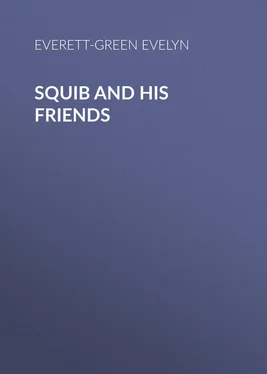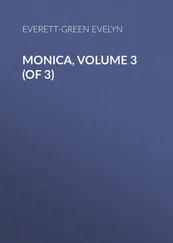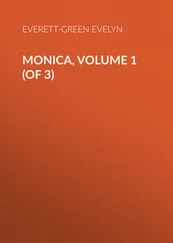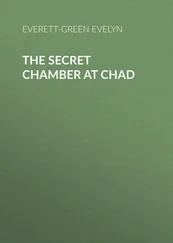Evelyn Everett-Green - Squib and His Friends
Здесь есть возможность читать онлайн «Evelyn Everett-Green - Squib and His Friends» — ознакомительный отрывок электронной книги совершенно бесплатно, а после прочтения отрывка купить полную версию. В некоторых случаях можно слушать аудио, скачать через торрент в формате fb2 и присутствует краткое содержание. Жанр: foreign_antique, foreign_prose, на английском языке. Описание произведения, (предисловие) а так же отзывы посетителей доступны на портале библиотеки ЛибКат.
- Название:Squib and His Friends
- Автор:
- Жанр:
- Год:неизвестен
- ISBN:нет данных
- Рейтинг книги:4 / 5. Голосов: 1
-
Избранное:Добавить в избранное
- Отзывы:
-
Ваша оценка:
- 80
- 1
- 2
- 3
- 4
- 5
Squib and His Friends: краткое содержание, описание и аннотация
Предлагаем к чтению аннотацию, описание, краткое содержание или предисловие (зависит от того, что написал сам автор книги «Squib and His Friends»). Если вы не нашли необходимую информацию о книге — напишите в комментариях, мы постараемся отыскать её.
Squib and His Friends — читать онлайн ознакомительный отрывок
Ниже представлен текст книги, разбитый по страницам. Система сохранения места последней прочитанной страницы, позволяет с удобством читать онлайн бесплатно книгу «Squib and His Friends», без необходимости каждый раз заново искать на чём Вы остановились. Поставьте закладку, и сможете в любой момент перейти на страницу, на которой закончили чтение.
Интервал:
Закладка:
“Oh, father, I think I can,” answered the child with brightening eyes. “I’ll explain everything to him so carefully – about being obedient and all that. I think he wants to be good – only he’s got nobody to teach him and be good to him. But I should like to teach him. I’m sure he has a very good heart, and he understands what I say, I’m quite sure.”
So the experiment was tried, and with signal success. The fierce dog became gradually tamed and dependable, and a fresh link was formed between Squib and his father.
Later on in the same year another incident occurred which increased the Colonel’s interest in “the odd one” of the family.
Like most country gentlemen of some leisure, Colonel Rutland was fond of hunting, although he could not give the time to it that some of his friends were able to do. Still, he had always one, and sometimes two hunters in his stable, and at this time, when Squib was just six years old, his favourite was a horse of the name of Charger, upon whom he had hunted three seasons in succession.
Charger had something of a history of his own with which Squib was not unconnected. Three years before, when the horse was five, and Squib three, the former had been brought up for Colonel Rutland’s inspection, as the owner desired to sell him. He was then only just broken, for he had done no work as yet, the farmer who owned him having wished to let him run as long as possible, and then to sell him to some of the gentry as a hunter and weight-carrier. He was a very beautiful creature, with a grand shoulder and very strong hind-quarters, legs as sound and fine as the huntsman himself could wish to see, and a well-turned head and gentle eye. The Colonel and his wife and some of the children all assembled at the front-door to examine and look at the horse, who stood pawing the gravel, seeming as if he knew perfectly the commotion his beauty and strength were exciting. There were several guests in the house who knew something about horses, and a great deal of conversation was going on after the animal had been walked, and trotted fast, his hoofs examined, and his eyes well peered into. He was growing rather restive now with all the waiting and testing, but was standing pretty quietly, held by the farmer, when suddenly little Squib, who was always very fond of animals, and seemed not to know the meaning of fear, ran forward from the group about his mother, and clasped his arms tightly round the hind leg of the young horse, laying his cheek against it with that caressing movement so common in little children.
A sudden hush fell upon the whole group – every man among them afraid to move or speak lest the horse should be frightened and kick out, as it seemed impossible that he should not do at that strange touch upon his leg. But the creature turned his head round, looked at the little, white clinging figure, and stood perfectly quiet under the unwonted caress. The next moment the Colonel had caught up his daring little son, and one of the gentlemen standing by said to the farmer with a short laugh, —
“I think you may take the horse round to the stables now; he has won himself a home here, or I am much mistaken.”
So Charger stayed, and never a horse was better worth his money, as the Colonel often said. He was so gentle that Lady Mary herself sometimes rode to hounds upon him by her husband’s side, and so strong and clever and enduring that the Colonel could have sold him for almost any money in his own county if he had wished to part with him.
As for Squib, although he did not long remember the exploit of which he had been guilty that day, the story was often told in his hearing, and it seemed to make a bond between him and Charger which was closer than between him and any other horse, although the child was fond of them all. He was fonder of Charger than of his own little Shetland pony, although Shag was a great friend and favourite. But Charger was so sensible, so kind, so friendly, and so big! There is always an attraction to a boy of native courage in the sensation of being mounted on a big horse. Often and often, when the great hunter was saddled and about to be brought round to the door, Squib would plead to be allowed to ride round upon him, and though on these occasions coachman himself would take the bridle and not permit any one else to superintend the child’s feat, it was accomplished again and again without any danger; for Squib had ridden his own pony bare-backed from the time he could get his small legs across the broad back, and was a veritable monkey for sticking on the back of anything with four legs.
But during this particular autumn, when Squib passed his sixth birthday, and Charger was “rising nine” as coachman called it, one of those sad mischances befell him which are unfortunately only too common with good hunters. He was carrying his master in his own gallant fashion over some very slippery, sticky ground, when, in alighting after a fine leap, he came down upon a treacherous bit of ground where the foothold was very bad. With an effort which seemed to imply that he was thinking first of his rider’s safety and second of his own, he avoided the fall which seemed for a moment inevitable, but he slipped badly and only recovered himself after a violent struggle. Colonel Rutland sprang safely to the ground and helped the gallant animal to get a better footing; but all this was not accomplished before Charger’s shoulder was badly strained, and he had to be laid up in a loose box and carefully doctored for many months before any one could think of riding him again.
Squib was constant in his attentions to the disabled favourite all that time, and he and Charger and Czar spent many a happy morning in the paddock together, where Charger was turned out for an hour or two on warm days “to exercise hisself” as the groom called it. Squib also made great friends with the veterinary surgeon who attended Charger, and who would tell him stories of animals by the hour together; and it was from him that Squib first heard the bad news about the poor hunter.
“He won’t never be good for hunting again, nor for that matter for riding either. That shoulder will always be weak. He might drop on it any time sudden like, and nobody cares to ride a horse like that. The only thing now is to break him for harness if it can be done; but he’s old to take to collar-work – more likely it’ll just break his heart instead, poor fellow!”
The tears rose in Squib’s eyes as he heard these words.
“They shan’t break Charger’s heart!” he cried indignantly. “I’m sure my father will never allow it.”
“Well, sir, I hope not, for I don’t think that horse’ll ever break, for all he’s so gentle and quiet. He’s got a spirit of his own, he has; and when a creature has never had a collar over his head up to nine year old, why, they don’t take kind to it, they don’t!”
Soon it became known that poor Charger’s hunting days were over, and it was quite a trouble to all the household to think that the master could never ride him safely again. Then came the question of breaking him for harness, but the few attempts that were made did not encourage the authorities to persevere.
“He throws hisself about so, sir,” coachman would explain to Squib. “He’s not used to it, and don’t know what it means. He comes from a race of hunters, and don’t have them family feelin’s as some young hacks do, as takes the collar like mother’s milk as you may say. He’ll only wrench his shoulder again, and go lame all his life; and that would be a sad pity, seeing as how well he is now.”
And then it was that a sudden inspiration seized upon Squib. He went straight from coachman’s presence to his father’s study, and stood silently beside him as he wrote busily before his table. But when the Colonel presently looked up, as if to intimate that he was ready to hear what his small son had to say, Squib “went off” with unwonted vehemence.
Читать дальшеИнтервал:
Закладка:
Похожие книги на «Squib and His Friends»
Представляем Вашему вниманию похожие книги на «Squib and His Friends» списком для выбора. Мы отобрали схожую по названию и смыслу литературу в надежде предоставить читателям больше вариантов отыскать новые, интересные, ещё непрочитанные произведения.
Обсуждение, отзывы о книге «Squib and His Friends» и просто собственные мнения читателей. Оставьте ваши комментарии, напишите, что Вы думаете о произведении, его смысле или главных героях. Укажите что конкретно понравилось, а что нет, и почему Вы так считаете.












